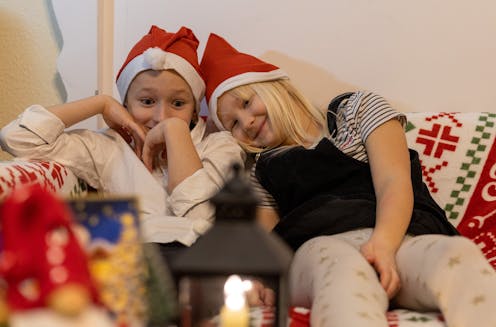Santa Claus is coming to town! How to help kids manage the big build-up to Christmas
- Written by Penny Van Bergen, Head of School of Education and Professor of Educational Psychology, University of Wollongong

School is out and Santa is on his way, but there’s still a bit of a wait before he wriggles down that chimney. The days before Christmas are both exciting and challenging for children and families.
How can you manage kids’ excitement in this last build-up to Christmas? What should you do if emotions run over? And how might you respond if all the focus on Santa means some kids start asking if he is real?
Help kids manage outbursts
Parents and carers may notice children are adorably ridiculous at this time of year (or maybe just ridiculous).
Each day brings a swirling mix of tears, laughter, shouts and tired panda eyes. Sleep patterns can also be disturbed across the Christmas break, with late nights and early mornings leading to extra tiredness.
For younger (and even older) children, temper tantrums[1] may be more common.
If your child does have an outburst, give them some time to cool off. Although it can be tempting, try not to enforce harsh punishments in the moment. An angry threat to cancel Christmas (“I’m going to tell Santa not to come!”) may be matched by an equally angry response by your child.
Instead, come back when you are both calm, acknowledge[2] how they and others might be feeling and discuss[3] how best to manage those emotions (“If you are feeling very excited, go outside and run around instead of hitting your brother”).
Also be conscious of your own emotions. Children often model[4] the emotions and behaviours they see from others. So, despite all the things you have to do at the moment, try and pause, relax and seek out opportunities for joy in this festive season.
Read more: Parents make mistakes. So what does 'good enough parenting' look like?[7]
Help children explore questions about Santa
Of course, Christmas holds a range of deeper meanings for religion and family. But a key source of excitement in the lead up to Christmas is Santa. The magical world of Santa, reindeers and elves sparks particular joy for kids.
If your child is in early primary school, you might be worrying “what happens if Stella discovers the truth”?
Try not to let this become a family stressor.
Children begin making distinctions between fantasy and reality in preschool, although often continue[8] to believe in Santa for longer: particularly if parents[9] promote these beliefs.
In one study[10], children who no-longer believed were interviewed about how they had felt when they realised Santa was not real. Some felt momentarily bad or disappointed but more than half reported feeling happy or relieved to know the truth. They had been wondering anyway.
If children are questioning their beliefs already, consider exploring this with them by asking “what do you think?” Either way, negative emotions tend to be short-lived[11]: indeed, many children continue to pretend to believe in Santa just for fun.
Help manage holiday expectations
For those at home before Christmas, complaints of boredom may already have set in. These are particularly challenging for parents who are still working.
Some children may be happy playing with siblings. For other children, it can help to create routines[12] to manage their expectations. This might include times you will be available to play with them, excursions and free play. Include children in the negotiations[13] and help them to manage excitement by creating a list of activities they would like to complete.
For families already away on holidays, the challenges are different but real[14]. An expectation of relaxing bliss can sometime contrast with a reality that is more intense.
Interviews with Danish children and their parents[15] about their trips away reveal both joy and tension, with closer living quarters and 24/7 activities bringing social overload and frayed tempers over time.
Routines can help here too, even if they differ from those at home. Map out when you will be sharing fun activities together and build in quiet time to soothe frayed nerves.
Plan Christmas Eve
For all children, Christmas Eve is likely to see a clash of excitement and emotion. Help children to plan out any family rituals beforehand, including what time they will go to bed.
For those with siblings, help them to plan who will complete what tasks. This might include chopping carrots for reindeer, pouring milk for Santa, or lighting special Christmas candles. Ensure the negotiations are fair and everyone is happy.
Above all, enjoy. Stories of stress and conflict related to Christmas abound, yet research shows an abundance of positive emotions[18] across the period. ‘Tis a most wonderful time of the year.
Read more: 8 tips to navigate Christmas if you have a fussy eater or child with allergies[19]
References
- ^ temper tantrums (onlinelibrary.wiley.com)
- ^ acknowledge (link.springer.com)
- ^ discuss (denhamlab.gmu.edu)
- ^ often model (www.ncbi.nlm.nih.gov)
- ^ Marta Wave/Pexels (www.pexels.com)
- ^ CC BY (creativecommons.org)
- ^ Parents make mistakes. So what does 'good enough parenting' look like? (theconversation.com)
- ^ often continue (journals.sagepub.com)
- ^ if parents (www.sciencedirect.com)
- ^ one study (link.springer.com)
- ^ short-lived (psycnet.apa.org)
- ^ create routines (journals.lww.com)
- ^ the negotiations (www.tandfonline.com)
- ^ different but real (www.tandfonline.com)
- ^ Danish children and their parents (www.emerald.com)
- ^ Helena Jankovičová Kováčová/ Pexels (www.pexels.com)
- ^ CC BY (creativecommons.org)
- ^ positive emotions (www.tandfonline.com)
- ^ 8 tips to navigate Christmas if you have a fussy eater or child with allergies (theconversation.com)

















